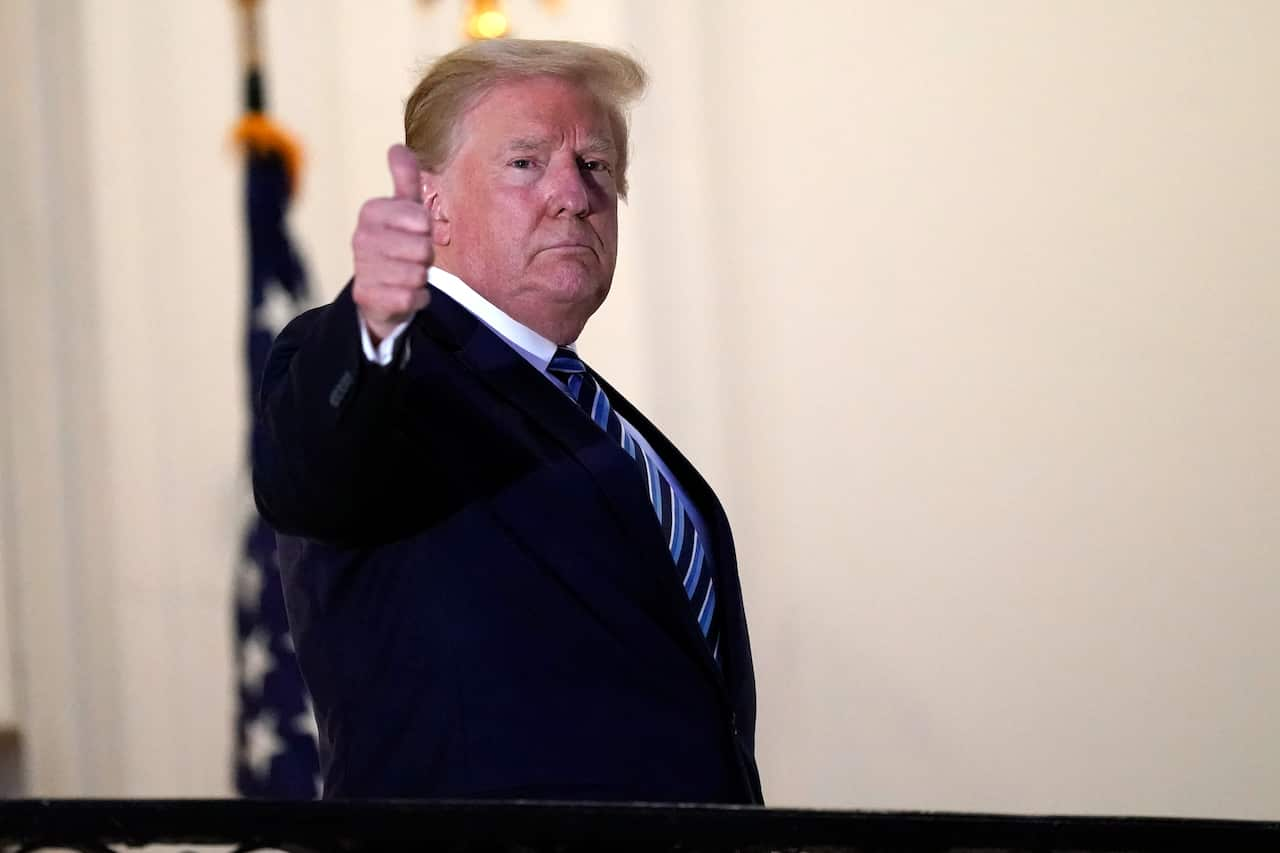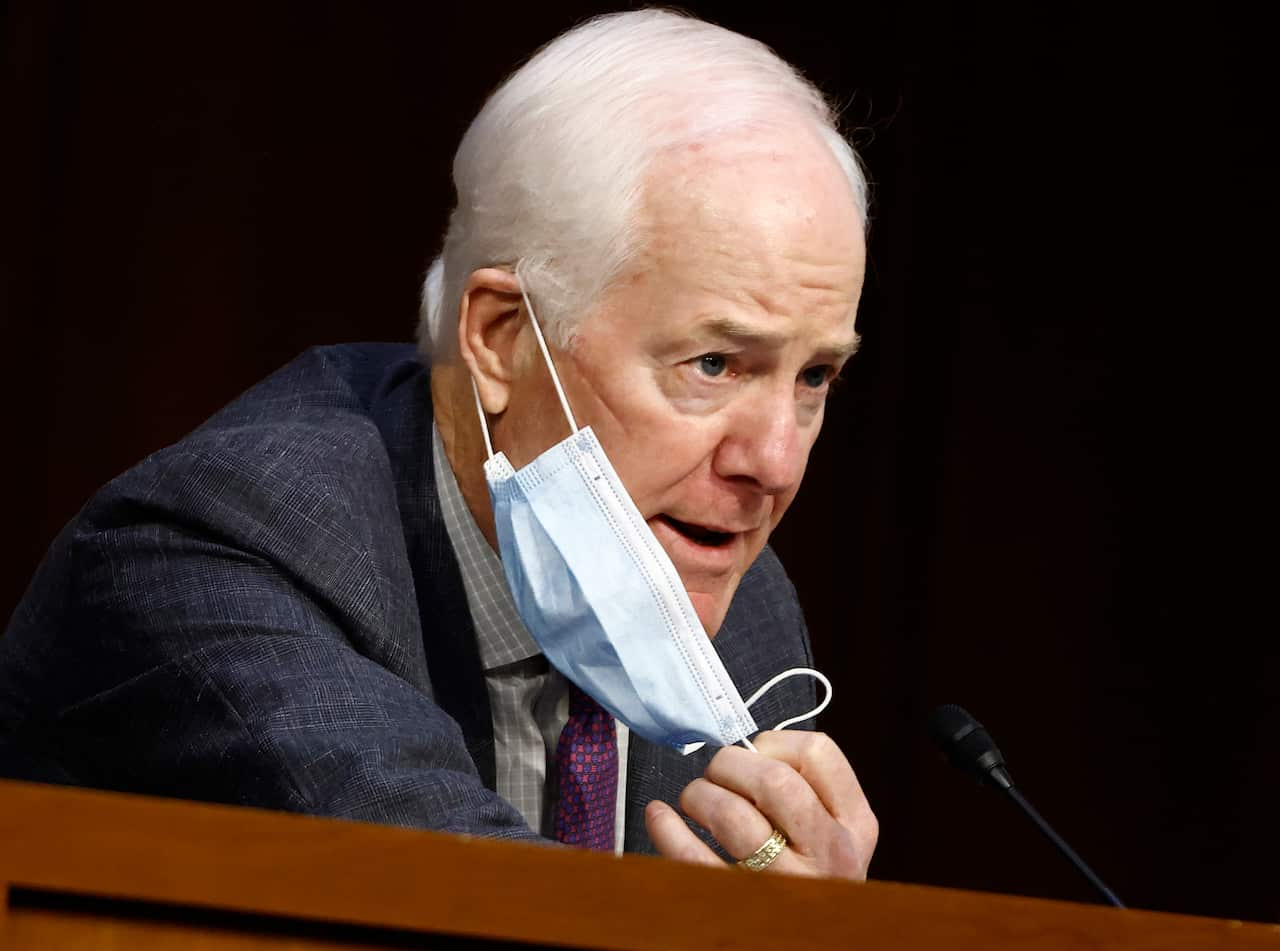Donald Trump's Supreme Court nominee Amy Coney Barrett has said it is an "open question" as to whether the president could pardon himself while adding that the top US judicial body "can't control" whether a president obeys its decisions.
On the third day of her four-day Judiciary Committee hearing, Justice Barrett also sought to allay Democratic fears that she would be an automatic vote to strike down the Obamacare healthcare law in a case due to be argued 10 November, promising an "open mind."
Justice Barrett sidestepped questions from senators on the ability of presidents to evade efforts to hold them accountable.
Mr Trump has said he has the "absolute power" to pardon himself, part of his executive clemency authority. Asked by Democratic Senator Patrick Leahy whether a president has such power, Justice Barrett said the "question has never been litigated".
"That question may or may not arise but it's one that calls for legal analysis of what the scope of the pardon power is. So because it would be opining on an open question when I haven't gone through the judicial process to decide it, it's not one on which I can offer a view," Justice Barrett added.

Mr Trump faces a criminal investigation about the conduct of himself and his businesses by a New York City prosecutor who is seeking his financial records and tax returns. Mr Trump also has issued executive clemency to political allies and friends.
Justice Barrett, a conservative federal appellate judge, is the Republican president's third selection for a lifetime job on the Supreme Court. Mr Trump has asked the Senate, controlled by his fellow Republicans, to confirm her before the 3 November US election.
Justice Barrett said "no one is above the law" but twice declined to answer directly when Mr Leahy asked her whether a president who refuses to comply with a court order is a threat to the US constitutional system of checks and balances within the three branches of government.
"The Supreme Court can't control whether or not the president obeys," Justice Barrett said.
Supreme Court rulings, Justice Barrett said, have the "force of law" but the court lacks enforcement power and relies on the other branches of government.
"A court can pronounce the law and issue a judgment but it lacks control over how the political branches respond to it," Justice Barrett added.
Justice Barrett declined to discuss whether Mr Trump is violating the US Constitution's "emoluments" clause with his business dealings, objecting to Mr Leahy's characterisation of the provision as an anti-corruption measure. The provision bar presidents from taking gifts or payments from foreign and state governments without congressional approval.
"I don't know if I would characterise it as an anti-corruption clause," Justice Barrett said, adding that it was designed to "prevent foreign countries from having influence".
Obamacare case
Justice Barrett could be on the high court for arguments in a challenge by Mr Trump and Republican-led states to the 2010 law formally called the Affordable Care Act (ACA) that has helped millions of Americans obtain medical coverage and includes protections for people with pre-existing conditions.
In response to Democratic suggestions that she would vote to strike down Obamacare in its entirety if one part is deemed unlawful, Justice Barrett said that if a statute can be saved, it is a judge's duty to do so.
Justice Barrett indicated she favours of a broad reading of the "severability doctrine" in which courts assume that when one provision of a law is unlawful, Congress would want the rest of the statute to remain in place. The Supreme Court has taken such an approach in recent years.
"I think insofar as it tries to effectuate what Congress would have wanted, it's the court and Congress working hand in hand," Justice Barrett said of the doctrine.
When judges address the legal question raised in the Obamacare case, the "presumption" is that Congress did not intend the whole statute to fall, Justice Barrett added.
"If I were on the court, and if a case involving the ACA came before me, I would approach it with an open mind," Justice Barrett told Republican Senator John Cornyn.
Justice Barrett has criticised previous Supreme Court rulings upholding Obamacare.

Abortion rights
Justice Barrett has faced questions on contentious social issues including abortion, which as a devout Catholic she personally opposes.
"This is history being made folks," Senator Lindsey Graham, the chairman of the panel, said.
"This is the first time in American history that we've nominated a woman who is unashamedly pro-life and embraces her faith without apology, and she's going to the court."
Justice Barrett, 48, would be the fifth woman ever to serve on the court and has reiterated her Tuesday comments that the landmark 1973 Roe v. Wade ruling that legalised abortion nationwide was not a "super-precedent" that could never potentially be overturned.
Justice Barrett's confirmation would give the court a 6-3 conservative majority. Republicans have a 53-47 Senate majority, making her confirmation a virtual certainty.
Democrats have said the winner of the presidential election should get to fill the court's vacancy left by the death of liberal Justice Ruth Bader Ginsburg.
The four-day hearing is scheduled to end on Thursday with testimony from outside witnesses. Republicans are preparing for a committee vote next week and a final Senate confirmation vote before the end of October. Mr Trump nominated Justice Barrett to a lifetime post on the court on 26 September.
Cameras in court
But Justice Barrett said she was open to at least one sweeping change for the nation's top judicial body - allowing cameras into the chamber for the first time in its 230-year history.
"I would certainly keep an open mind about allowing cameras in the Supreme Court," Justice Barrett said under questioning by Republican Senator Chuck Grassley, who has long advocated such a step.
"Many of us believe that allowing cameras in the courtroom would open the courts to the public and bring a better understanding of the judiciary," Mr Grassley said.
Advocates of cameras in the courtroom argue that it is an important step to allow transparency in the judicial process. Some US state and local courts permit cameras and allow live TV broadcasts of certain proceedings, but federal courts largely do not.
Mr Grassley has been pushing for the introduction of cameras to the Supreme Court for at least 15 years and has introduced legislation that would allow video coverage of court proceedings.
Neither video nor still cameras are allowed in the Supreme Court chamber. But the court, in a break with precedent, allowed live audio of its oral arguments at the end of its most recent term and during its current term as it hears cases by teleconference due to the coronavirus pandemic.
During the hearing, Republican Senator Ben Sasse told Barrett he opposes cameras in the courtroom because it would lead to "theatrics".
"I think we'd get a lot more Michael Avenatti nonsense, if we had cameras in the court," Mr Sasse said, referring to the convicted lawyer who represented adult-film actress Stormy Daniels in litigation against Mr Trump.
While Supreme Court nominees have expressed openness to cameras before, sitting justices have been opposed. They argue that allowing video coverage would make it difficult to conduct arguments effectively and would encourage theatrics by attorneys arguing before them.

